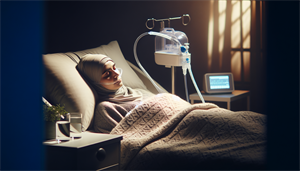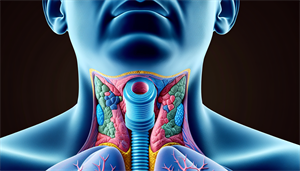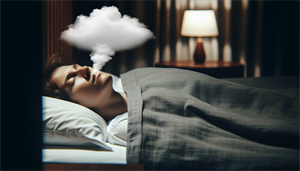Imagine spending every night in an invisible battle, fighting for each breath, never truly resting. This is the reality for millions of people with sleep apnea. A good night’s sleep is not just a luxury, it’s a necessity for our bodies to function optimally. Yet, a serious sleep disorder like sleep apnea can disrupt this vital process, leading to severe health risks and a potential decrease in untreated sleep apnea life expectancy if left untreated.
Sleep apnea is a condition that merits serious attention, not just for the distressing symptoms it presents but also for its potentially disastrous health consequences. It’s a silent assassin, working in the dark, stealthily chipping away at your health. The grim reality is, untreated sleep apnea life expectancy can be shortened, making it all the more critical to understand this condition and seek appropriate treatment.
Key Takeaways
-
Untreated sleep apnea significantly increases the risk of mortality, cardiovascular diseases, and other health issues, with severe cases potentially doubling the risk of death compared to treated cases.
-
Effective treatment for sleep apnea, including CPAP therapy, oral appliance therapy, and surgical interventions can manage symptoms, reduce health risks, and possibly extend life expectancy.
-
Lifestyle changes, such as maintaining a healthy weight, engaging in exercise, practicing breathing exercises, and adjusting sleep positions, can contribute to managing and improving sleep apnea symptoms.
The Grim Reality of Ignoring Sleep Apnea

Sleep apnea, an all too common sleep disorder, carries with it a grim reality. It poses a silent threat, often going undiagnosed as people dismiss their symptoms as merely poor sleep or daytime sleepiness. Yet, leaving sleep apnea untreated can lead to severe health consequences and a substantial reduction in life expectancy. Studies have shown that this condition increases the risk of death by 17%, and in severe cases, untreated sleep apnea could double the risk of death compared to those who treat their sleep apnea.
Life expectancy can be significantly influenced by the severity of sleep apnea. If left untreated, especially severe cases, it can result in long-lasting health issues like:
-
heart and organ damage
-
high blood pressure
-
stroke
-
heart failure
Older adults with untreated sleep apnea face a 38% higher risk of heart failure. Yet, there’s hope on the horizon.
Properly treating sleep apnea can decrease the stroke risk by half and quintuple the odds of avoiding heart attacks, in contrast to those cases left untreated.
The Connection Between Sleep Apnea and Mortality
Exploring the link between sleep apnea and mortality reveals sobering figures. Here are some key statistics:
-
Life expectancy can be diminished by over a decade if sleep apnea remains untreated.
-
Sleep apnea increases the risk of death by 17%.
-
Severe cases of sleep apnea left untreated could double the risk of death compared to those receiving treatment.
A 20-year follow-up study revealed the following findings on sleep apnea:
-
There is a four-fold increase in the mortality rate among people with sleep apnea, including both moderate and severe cases, as well as obstructive and central sleep apnea.
-
Individuals with sleep apnea are, on average, 74% more likely to experience mortality from any cause compared to those without the disorder.
-
People with severe sleep apnea are at an alarming risk of cardiovascular disease, which is the leading cause of death among this group.
This underscores the importance of effectively managing sleep apnea to reduce the risk of cardiovascular complications.
How Sleep Apnea Affects Longevity
Sleep apnea does not only disrupt sleep but life itself. The condition is associated with:
-
an increased risk of developing insulin resistance, type 2 diabetes, and metabolic syndrome
-
obesity and heart disease, both of which can contribute to the onset of these conditions
-
a 70% increased risk of death if left untreated
Beyond physical health, sleep apnea also takes a toll on mental health. There’s a substantial link between untreated sleep apnea and an increased risk of brain disorders, as it’s significantly associated with a 43% higher likelihood of developing some form of dementia.
Unveiling the Health Consequences of Sleep Apnea

The impact of sleep apnea stretches beyond sleep disruption and drowsiness during the day. It looms large and perilous, bringing along a host of health consequences that can drastically change, if not endanger, one’s life. The relationship between sleep apnea and cardiovascular diseases is a significant one, with untreated sleep apnea being the most common complication for patients. Indeed, it’s directly associated with severe conditions like:
-
high blood pressure
-
stroke
-
coronary artery disease
-
heart failure
The numbers are stark. Individuals with sleep apnea face a 30% heightened risk over four to five years of experiencing a heart attack or mortality. Each year, 38,000 Americans with sleep apnea die from heart disease. But the health consequences of sleep apnea don’t stop there. This condition also has a significant impact on metabolic health and respiratory function.
Heart Health Hazards
The connection between sleep apnea and cardiovascular disease is a perilous one. Sleep apnea is associated with an elevated risk of developing cardiovascular diseases, including:
-
strokes
-
high blood pressure
-
heart conditions
-
coronary artery disease
It’s a disturbing fact that approximately half of individuals with obstructive sleep apnea (OSA) also have high blood pressure, and each sleep apnea event per hour increases the risk of developing high blood pressure by 1%.
For men, the risk escalates even further. Males with severe sleep apnea have a two to three times higher risk of experiencing a stroke, underscoring the significant impact of sleep apnea on stroke risk.
Metabolic Mishaps and Weight Gain
Sleep apnea can have several negative effects on the body, including disrupting sleep and the body’s metabolic balance. It can lead to:
-
Hormonal imbalances
-
Disrupted metabolism, contributing to weight gain through changes in hormone production
-
Inflammation
-
Low oxygen levels
-
Disruption of the nervous system function
These factors increase the likelihood of developing type 2 diabetes.
The coexistence of diabetes and sleep apnea presents its own set of challenges. Individuals dealing with both conditions encounter challenges in regulating blood sugar levels and are at an increased risk of health issues. Those with type 2 diabetes and sleep apnea are particularly vulnerable to a heightened risk of premature mortality.
Breathing Complications Beyond the Night
Significant respiratory complications can also arise from the breathing disturbances that characterize sleep apnea. Sleep apnea contributes to inflammation and vascular damage through various mechanisms, including systemic inflammation, increased levels of inflammatory markers due to hypoxemia and sleep deprivation, and disruption of vascular endothelium homeostasis. This combination of factors can escalate cardiovascular risks by harming the blood vessels.
Long-term lung function is also affected by sleep apnea. It hastens the deterioration of lung function, reduces airflow, and induces variations in oxygen levels within the lungs. These alterations can lead to a variety of complications, such as:
-
hypertension
-
cardiovascular disease
-
stroke
-
metabolic syndrome
The Silent Nightly Battle: Understanding Sleep Apnea Symptoms

The first step towards seeking diagnosis and treatment is recognizing the signs and symptoms of sleep apnea. It’s a silent nightly battle, the symptoms of which may often go unnoticed or be dismissed as mere sleep disturbances. Loud snoring, brief periods of breathing cessation during the night, and waking up gasping in the middle of the night are important nighttime symptoms of sleep apnea.
Daytime symptoms manifest gradually and include grogginess and difficulty concentrating. The insidious nature of these symptoms often leads patients to underestimate the seriousness of their situation until it substantially impairs their daily activities and functions.
The impact of sleep apnea symptoms can significantly affect an individual’s quality of life, leading to an elevated risk of vehicle accidents caused by excessive daytime sleepiness.
Life-Saving Measures: Treating Sleep Apnea

Despite the grim realities of sleep apnea, the good news is that the condition is treatable. With the right treatment, individuals with sleep apnea can manage their symptoms, mitigate associated health risks, and even extend their life expectancy. The predominant medical intervention for sleep apnea is Continuous Positive Airway Pressure (CPAP) therapy. CPAP helps maintain an open airway by delivering a continuous stream of positive-pressure air through a mask, which can substantially decrease the likelihood of developing severe health complications and prolong life expectancy.
Apart from CPAP therapy, alternative sleep apnea treatment options include neurostimulation, various surgical interventions, and the use of custom-made oral appliances, especially for mild or moderate Obstructive Sleep Apnea (OSA).
Continuous Positive Airway Pressure (CPAP)
The most common and effective treatment for sleep apnea is Continuous Positive Airway Pressure (CPAP) therapy. By ensuring an unobstructed airway and minimizing apnea episodes during sleep, CPAP therapy decreases the likelihood of cardiovascular and other health issues linked to sleep apnea, ultimately enhancing the life expectancy of patients.
The therapy functions by delivering a consistent air pressure to maintain open airways during sleep, thereby preventing airway collapse or obstruction and promoting uninterrupted breathing to decrease the frequency of apnea events.
The timeframe for observing improvements after starting CPAP therapy varies among individuals. While some may notice immediate effects, others may require weeks or even longer to experience the benefits.
Oral Appliance Therapy
Another potential treatment for sleep apnea is oral appliance therapy. These custom-made devices can be a suitable alternative for those who struggle with CPAP therapy. Oral appliances for sleep apnea function by preventing the airway from closing and keeping the tongue and lower jaw in place, thereby keeping the airway open during sleep.
Oral appliance therapy is regarded as a safe and effective option for a majority of patients with sleep apnea. A dentist or sleep specialist tailors an oral appliance for a sleep apnea patient through a comprehensive examination, considering several factors such as the patient’s dental health, before selecting the most appropriate oral appliance.
Surgical Interventions
Surgical interventions may be necessary for some to treat sleep apnea. However, surgery is generally considered a final option when other treatments, such as CPAP therapy or lifestyle changes, fail to alleviate symptoms for a period exceeding three months. Procedures vary depending on the underlying cause of sleep apnea. Some common surgical interventions include:
-
Uvulopalatopharyngoplasty (UP3): involves the removal of excess tissue from the throat to facilitate improved airflow
-
Maxillomandibular advancement (MMA): repositions the upper and lower jaws to enlarge the airway
-
Tracheostomy: creates a new airway by making an opening in the neck and inserting a tube
It is important to consult with a healthcare professional to determine the most appropriate treatment option for your specific case of sleep apnea.
While surgical interventions can be effective, they come with their own risks, including:
-
Allergic reactions to anesthesia
-
Excessive bleeding
-
Infection
-
The possibility of symptoms not improving or additional breathing problems developing
Therefore, the decision to undergo surgery should be made after careful consideration and consultation with a healthcare provider.
Lifestyle Adjustments to Combat Sleep Apnea

Lifestyle adjustments can also play a vital role in managing sleep apnea, apart from medical interventions. Here are some lifestyle changes that can help alleviate sleep apnea symptoms:
-
Maintain a healthy weight
-
Engage in regular exercise
-
Perform tongue stretches and tongue push-ups to strengthen tongue and throat muscles
-
Practice yogic breathing
These lifestyle changes can have a positive effect on managing and helping to improve sleep apnea symptoms.
Another crucial lifestyle modification is adjusting sleep positions. It’s recommended to sleep on your side to help alleviate sleep apnea symptoms as it can significantly reduce the number of apnea episodes a person experiences each night.
These lifestyle changes, in conjunction with medical treatments, can greatly improve the quality of life for individuals with treated sleep apnea, especially those with moderate sleep apnea.
Early Diagnosis: The Key to a Longer Life
Preventing long-term health complications and improving life expectancy can be significantly influenced by early diagnosis and treatment of sleep apnea. The impact of early diagnosis on the life expectancy of sleep apnea patients is substantial, as untreated sleep apnea can elevate the risk of mortality and the development of life-threatening health conditions.
Recognizing the warning signs of sleep apnea, such as chronic exhaustion, waking up gasping for air, or loud snoring, is crucial. The sooner a diagnosis is made, the sooner treatment can begin, helping to mitigate the health risks associated with this condition.
Regular check-ups and open communication with healthcare providers can help in early detection and management of this condition.
Navigating Through Sleep Medicine
In managing sleep apnea, sleep medicine plays an essential role. It encompasses a range of therapies and interventions aimed at enhancing nighttime breathing, diminishing daytime sleepiness, and enhancing overall sleep quality. Working with sleep medicine specialists can ensure precise diagnosis, personalized treatment plans, ongoing monitoring, and comprehensive care.
There are reliable sources available for obtaining information about sleep medicine and sleep apnea. These include:
-
CDC’s Sleep and Sleep Disorders resources
-
American Academy of Sleep Medicine’s Sleep Education website
-
MedlinePlus from the National Institutes of Health
-
Sleep Foundation
Summary
Sleep apnea is a common yet serious sleep disorder that can significantly impact an individual’s quality of life and overall health. It’s a silent health risk, often going unnoticed until it has caused significant damage. However, with early diagnosis and effective treatment, individuals with sleep apnea can manage their symptoms, mitigate health risks, and even extend their life expectancy.
The journey through sleep apnea is undoubtedly a challenging one. But armed with knowledge, timely treatment, and lifestyle changes, it is possible to turn the tide against this silent disruptor of sleep. The key lies in recognizing the symptoms early, seeking medical help, and following through with recommended treatments and lifestyle changes. It’s never too late to prioritize sleep and embrace a healthier, longer life.
Frequently Asked Questions
How long can you survive with sleep apnea?
Untreated obstructive sleep apnea can shorten your life by 12-15 years, but with diagnosis and treatment, its effects can be alleviated, ensuring it won't shorten your life.
Is severe sleep apnea considered a disability?
Severe sleep apnea is not considered a disability by the SSA, but eligibility for benefits may be possible if other resulting symptoms meet the disability criteria.
How I naturally cured my sleep apnea?
To naturally cure sleep apnea, maintain a healthy weight, change your sleep position, avoid alcohol and smoking, try yoga, and elevate the head of the bed. These lifestyle changes can help in treating sleep apnea naturally.
Can you live full life with sleep apnea?
It's important to address sleep apnea to live a full life, as it can increase the risk of heart attack or death, especially with severity. Jun 1, 2019
What is sleep apnea and how does it affect health?
Sleep apnea is a serious sleep disorder that can lead to health complications like heart disease, stroke, high blood pressure, and diabetes if left untreated. It can even reduce life expectancy.


